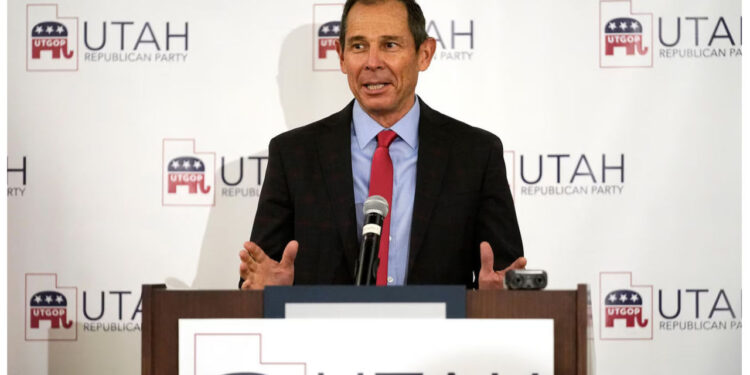A dozen Utah Republicans aiming to replace Mitt Romney in the United States Senate will face off Saturday for the party nomination in a battle likely to show the kind of politicaal conservatism that most appeals to modern Utah voters.
Romney has long been the face of the party’s more moderate wing, and watchers are eager to see whether voters choose a successor whose beliefs are more aligned with the departing senator’s or Utah’s other U.S. senator, conservative Mike Lee, who supports former President Donald Trump.
The victor of Saturday’s state GOP convention, which tends to favor far-right candidates who appeal to the most ardent party members, may gain an advantage in the campaign. Losing candidates can still qualify for the primary ballot on June 25 by gathering signatures, so Republican voters will ultimately determine who will succeed Romney.
“Ultimately, the successful candidate in the primary election phase will be the candidate who best connects with general Utah Republican values, rather than the person who can stake out the farthest right position possible, even if that helps them to some extent with the delegates,” said Damon Cann, head of Utah State University’s political science department.
The packed campaign, which includes a congressman, a former state legislative leader, and the lawyer son of a former senator, will not only set the tone for Utah conservatism after Romney but will also likely act as a litmus test for Trump’s popularity in the Beehive State.
Those most closely linked with the troubled former president, particularly former state House Speaker Brad Wilson, are expected to perform well during the convention. However, political scientists like James Curry of the University of Utah believe a more moderate candidate, such as U.S. Rep. John Curtis, will win the primary.
“This is a type of state where I think you actually have a slight advantage being more anti-Trump, if not decisively and vocally so, which is not something you’d find in most states where Republican voters are concerned,” Curry said in an interview.
While Trump has gained support in the state party, he has long been unpopular with members of the Church of Jesus Christ of Latter-day Saints, sometimes known as the Mormon Church, who account for almost half of the state’s 3.4 million citizens.
Curtis, 63, has deliberately sought to distinguish himself from Trump and even Romney, seeking to carve his own path in the Senate. However, his record of pushing fellow House Republicans to tackle climate change, just like Romney urged party members to abandon Trump, has prompted many to draw parallels between the two.
Even Wilson, 55, who embraced Trump earlier this year, has made few mentions of the former president during the campaign. The decision marks a divergence from several far-right candidates in other states who have attempted to use Trump’s political strength to win their own contests.
Curry believes that the party nomination will have little weight in a state where Republican delegates are frequently unrepresentative of the party’s overall membership. Despite being booed by delegates at previous conventions and losing the nomination in 2018, Romney won the statewide popular vote.
The contenders have not sought Romney’s endorsement, which Cann believes is rare in campaigns involving a departing incumbent. Several candidates have sought the support of Lee’s more conservative counterpart, who is well-liked by delegates, but Lee has yet to endorse anyone for the Senate.
Curtis, Wilson, and businessman Jason Walton have already secured their spots on the primary ballot through signature gathering. Brent Orrin Hatch, son of Utah’s longest-serving U.S. senator, the late Orrin Hatch, and a few others who filed paperwork have until mid-June to exercise their option.
Wilson has raised almost $2 million from supporters and loaned his campaign an extra $2.8 million, according to Federal Election Commission filings. Curtis has raised approximately $3 million, including funds left over from his previous congressional campaign.
Republican nominees for governor, Congress, and other high-profile positions will also be chosen at Saturday’s convention. Incumbent Gov. Spencer Cox has several prominent competitors, but Cann and Curry believe the moderate Republican will win the primary even if he is not picked as the party’s nominee.










